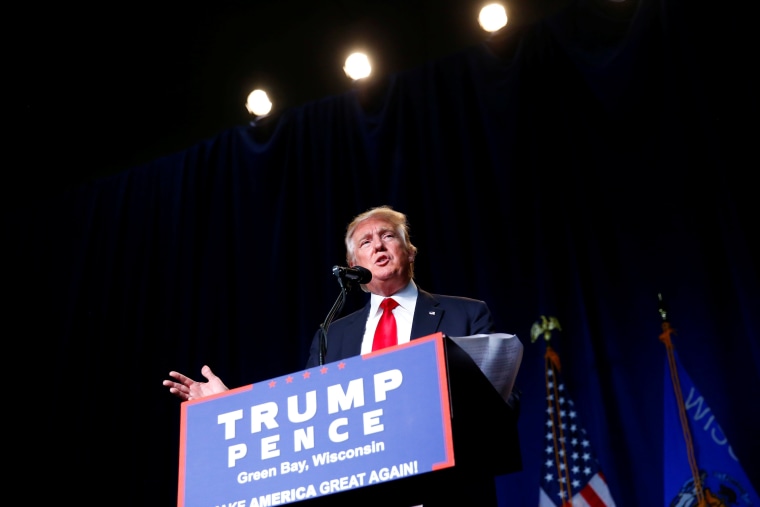GREEN BAY, Wisc. — Donald Trump on Friday offered an olive branch to the Republican Party, endorsing the three Republican lawmakers — House Speaker Paul Ryan, Arizona Sen. John McCain and New Hampshire Sen. Kelly Ayotte — that he had snubbed earlier in the week.
"We will have disagreements, but we will disagree as friends and never stop working together toward victory, and very importantly toward real change," Trump said. "So, in our shared mission to make America great again, I support and endorse our speaker of the House Paul Ryan.
"He's a good man, and a good guy," Trump said.
Trump also said he holds "in the highest esteem" McCain for his "service to our country in uniform and in public office," and offered his full support for the candidate, who’s facing a primary challenge from the right and a competitive general election fight. Trump had previously dismissed McCain as a "loser" because he was captured and held in a Vietnam prison during the war, and this week refused to endorse him because he said McCain didn’t treat veterans well.
And he offered support for Ayotte, one of the GOP’s most vulnerable senators, who Trump earlier suggested to the Washington Post had shown weakness and a lack of leadership in New Hampshire.
"She’s a rising star and will continue to represent the great people of New Hampshire so very well for a long long time," Trump said Friday.
Related: Ryan, Trump Feud Cools But Frustration Lingers
But the endorsements are likely to be more of a boon for Trump than the three Republicans, as Trump’s decision to snub them hurt him with the party nationwide.
Trump’s his initial refusal to back the three — and particularly his reluctance to endorse Ryan, an unprecedented move from a major party nominee — sparked fresh questions over Trump’s viability in the race.
Some critics and political pundits wondered this week whether Trump might end up dropping out of the race, as his poll numbers plummeted in key states. Vulnerable Senate Republicans were forced to scramble to answer for his critiques and controversies as he faced heavy blowback for his criticism of the family of a Muslim U.S. Soldier who died a war hero, and many Republicans openly wondered whether Trump wanted to torpedo his own party.
Earlier Friday Ryan brushed off speculation Trump would need to be replaced on the ballot and said it was his “duty” to uphold the results of the GOP primary. But Republicans warned that, in particular, Trump’s refusal to endorse Ryan could hurt him in a state that once seemed winnable for Republicans.
Wisconsin House Speaker Robin Vos wrote an op-ed on Friday saying he was “embarrassed” to have Trump as the nominee and warning that," If Donald Trump wants to have a chance to win in November, he should start following Paul Ryan’s lead, not criticizing him.” He suggested that Wisconsin’s activists and operatives would be reluctant to work or vote for Trump if he kept up the feud with Ryan.
In an interview, Vos said he had no indication whether Trump had read his op-ed, but said it was “definitely possible” that Trump’s opposition to Ryan could hurt him in the state in November.
“Paul Ryan’s support is so wide and so deep that Donald Trump wading in on the other side made no political sense,” he said.
After Trump's endorsement, a spokesperson for Ryan said: "He appreciates the gesture and is going to continue to focus on earning the endorsement of the voters in southern Wisconsin."
While Republicans hold a majority in both chambers of the state legislature, and most of the state’s statewide elected officeholders are Republican, the GOP hasn’t won the state in a presidential year in more than 30 years, and this year initially looked like their best shot at turning the tide. To win, however, Trump will need to play in Ryan’s district, which encompasses all or parts of five of the state’s top 10 most populous counties. Three of those five went for Romney last cycle, when he lost the vote by 7 points.
Republicans in the state say Trump will have to boost turnout beyond what Romney achieved in those populous, deep-red counties in the Milwaukee suburbs, and those are populated with Republicans that traditionally pose a challenge for Trump: Upper-middle-class, college-educated white voters. Indeed, Trump lost the district during the primary to Ted Cruz by 19 points.
And dismissing the area’s congressman — who’s viewed favorably by 84 percent of the district’s Republicans and independent-leaning voters, according to a recent Marquette Law U poll — was unlikely to win him many fans in the district.
As Brendan Scholz, a GOP lobbyist and former state party executive director put it, the state’s voters don’t like being treated “like we’re second-rate."
“It’s like we’re second rate. He smacks us and then he wants our help — seriously? If you beat me up, you punch me in the face, I’m not just going to take it,” he said.
